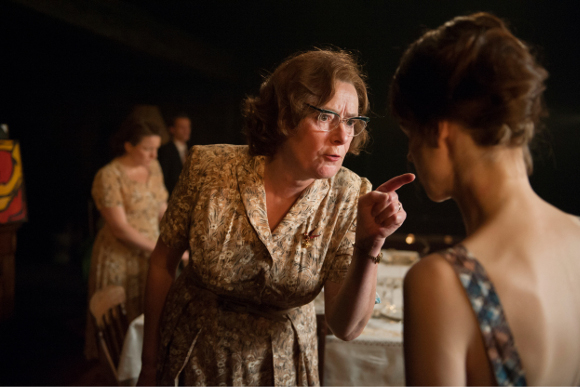Roots

© Stephen Cummiskey
Arnold Wesker's Roots (1958), the middle play of his famous trilogy, was as important and life-changing a play for its generation at the Royal Court – where it surfaced in 1960 – as was Look Back in Anger four years earlier, and it's no less than thrilling to have director James Macdonald revive it so beautifully at the Donmar.
The significance of Roots, and of Wesker, is explained in a brilliantly incisive programme note by David Edgar, but still people around me were reeling with surprise and delight in the two intervals; the second act scene between Beatie and her mother, with its talk of clothes, cooking and socialism, and tin bath preparations, is even forgotten by those (including me) fully primed for the rousing third act epiphany.
Roots marks Beatie Bryant's (Jessica Raine) homecoming to a family of Norfolk farm labourers. She's a painter, now, having taken up in London with Ronnie Khan (the intellectual idealist in the trilogy, the Wesker figure) whom they are all waiting to meet. And in its quotidian detail and steady thrum of domestic chatter, we have the sense of Beatie "improving" herself and finding her own voice.
The play is a working class classic precisely because it charts that historic post-war shift in social mobility and awareness through education, politics and art; Beatie here demonstrates her new-found elation in music to the grumpily bovine figure of her mother (a performance of sustained and enthralling brilliance by Linda Bassett, who is morphing into Dandy Nichols) by putting on a record of Bizet's "L'Arlesienne Suite" and cavorting to the farandole.
Raine's meticulous, quivering performance has a beguiling honesty and vulnerability. Irving Wardle said you always knew that a strong-headed Joan Plowright (the original Beatie) would be alright; with Raine, you're not sure, though her triumph as the rain sleets down and the family reconvenes for their high tea at the table is momentarily and theatrically complete.
You enter the Donmar to the accompaniment of cooking smells and birdsong, followed by talk in a thick country burr of indigestion, unemployment, a new dress from Swan and Edgar, pop songs, love in the afternoon and family squabbles.
There's a potato-peeling Lawrentian realism at work, but also a crepuscular aesthetic beauty in the shadows and half-light of Guy Hoare's exceptional poetic lighting on Hildegard Bechtler's grey, ramshackle cottage, with a practical staircase to one side.
Raine's performance, superbly buttressed by Bassett's, is surrounded by others of equal distinction: Lisa Ellis and Carl Prekopp as her unimpressed siblings, with Michael Jibson and Emma Stansfield as their respective spouses; David Burke as a nostalgic old rum bugger of a neighbour; Nic Jackman as the farm manager; and Ian Gelder as Beatie's father, not seeing what any of the fuss is about and sneaking a crafty cigarette on the side while contemplating the grim future.










